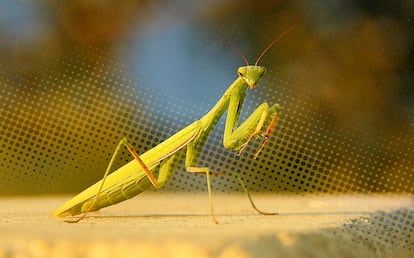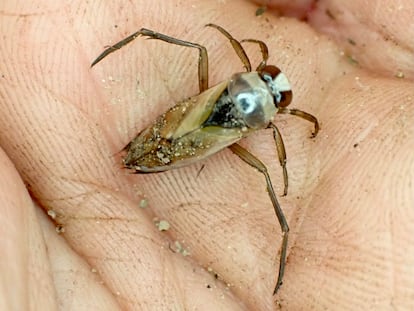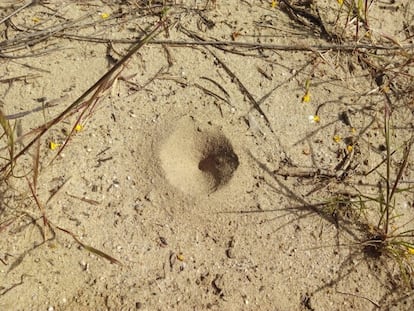Stag beetles, antlion, spiders and other relatives: The joy of being a voyeur of the animal kingdom
On vacation, free time awakens our curiosity and the capacity for observation, those daughters of boredom

The other afternoon I saw a stag beetle, the beautiful insects whose males display large jaws that resemble deer antlers, which they use to fight among themselves. Observing a lucanus cervus — its scientific name — flying vertically is quite a spectacle. They measure up to 7.5 centimeters. They look like a little buzzing demon, and it’s impossible not to jump when its black patent-leather figure looms over your shoulder. I have always associated the animal with summer holidays (you never see it when you go to work), just like lizards, dung beetles, octopuses, mosquitos and jellyfish. Small flycatcher birds perch on the handlebars of bicycles, and Lovecraftian cicadas crackle among the pines.
There are also the notonectas, or backswimmers, the little water bugs that thrive in soupy-green freshwater. Just a week ago, I went into the old open tank that we use as a swimming pool to clean it. It was a great opportunity to observe critters, some very strange and alarming. I was returned to the years of childhood, the happy days when we caught handfuls of backswimmers while the adults emptied the pool. Swift predators of small aquatic life, they have a reputation for stinging, but I have never been harmed, and I find them to be very attractive and interesting beings if you look closely. They swim with two hind legs like oars that propel them in a way that resembles small mechanical toys. Some people don’t know this, but backswimmers fly. When you take them out of the water, they come back. You never seem to get rid of them.

Seeing such creatures returns us to the carefree summer days of childhood. If childhood is paradise lost, childhood summers are its high season. The other day we suspended a tennis match — it was very hot, and I was losing — to observe in a corner of the court the gastronomic copulation in which the female praying mantis ate her smaller partner: starting with the head, which is what males usually use least at those times.
That is one of the great pleasures of the summer holidays: being able to contemplate at ease, as in childhood, the fauna that surrounds us. We finally get a chance to look at bugs. In the garden and on the beach, I always carry a pair of binoculars or a small telescope along with my book and iPod.
It is easy and rewarding to transform yourself into a Gerald Durrell, to turn your holiday destination into a Corfu and the critters into your family. We can all be Thoreau and David Attenborough during a heatwave. Life unfolds before your eyes. Boredom births free time, awakens curiosity and the ability to observe. You can spend hours studying the prey caught on the web of the garden spider (Araneus diadematus) and the creature itself, with a cross on its abdomen, given over to its spidery thing. Or note how ants and other small insects slip into the circular sand hole dug by the antlion larva and are torn to pieces by their curved mandibles, emerging from the bottom of their slippery trap.

Every summer has its totemic animal. One year it was the squirrels, which bred in a fork of a tree topped by the wind; another, the stone-curlews with their penetrating eyes; another the shrikes, with their sinister habit of impaling their little victims. In the sea, there was the summer of the grunt or batfish (Dactylopterus volitans), with its wing-like fins. We spent long hours looking for it, drunk with turquoise waters and Cousteau syndrome.
The tragedy of some is a source of solace for the summer naturalist. We have already talked about the victims of the ant lions and the garden spiders. The only time I have seen a viper swallowing its prey (a field mouse) was while I was falling asleep in a hammock trying to read In Search of Lost Time (the long overdue reading of the classics, that perfect complement to the contemplation of nature). It was a black asp. You never see as many snakes as in summer.
Sign up for our weekly newsletter to get more English-language news coverage from EL PAÍS USA Edition
Tu suscripción se está usando en otro dispositivo
¿Quieres añadir otro usuario a tu suscripción?
Si continúas leyendo en este dispositivo, no se podrá leer en el otro.
FlechaTu suscripción se está usando en otro dispositivo y solo puedes acceder a EL PAÍS desde un dispositivo a la vez.
Si quieres compartir tu cuenta, cambia tu suscripción a la modalidad Premium, así podrás añadir otro usuario. Cada uno accederá con su propia cuenta de email, lo que os permitirá personalizar vuestra experiencia en EL PAÍS.
¿Tienes una suscripción de empresa? Accede aquí para contratar más cuentas.
En el caso de no saber quién está usando tu cuenta, te recomendamos cambiar tu contraseña aquí.
Si decides continuar compartiendo tu cuenta, este mensaje se mostrará en tu dispositivo y en el de la otra persona que está usando tu cuenta de forma indefinida, afectando a tu experiencia de lectura. Puedes consultar aquí los términos y condiciones de la suscripción digital.









































